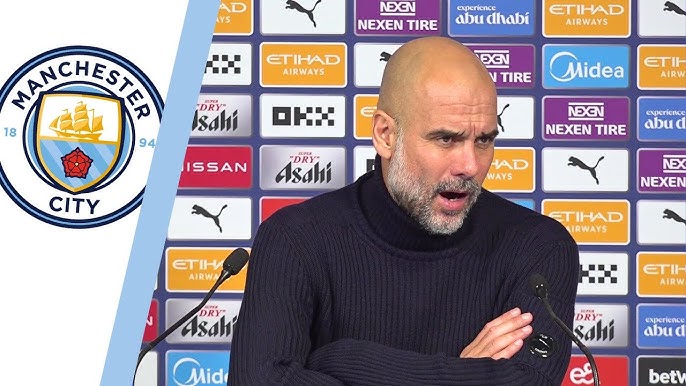€290 million summer spending spree that will see six high-profile players join Pep Guardiola’s squad

Manchester City stands on the precipice of one of the most transformative transfer windows in modern football history. According to renowned transfer specialist Fabrizio Romano, the Premier League champions are orchestrating an ambitious €290 million summer spending spree that will see six high-profile players join Pep Guardiola’s squad. This unprecedented investment represents not merely squad enhancement but a complete philosophical reimagining of City’s approach to sustained excellence in an increasingly competitive football landscape.
The magnitude of this proposed expenditure dwarfs even the most ambitious transfer windows of recent years, positioning Manchester City as the architects of a new era in football recruitment. This comprehensive analysis examines each target, the strategic rationale behind these acquisitions, and the broader implications for both Manchester City and the modern football ecosystem.
The 2024-25 campaign has served as a catalyst for Manchester City’s summer revolution. Despite their historical dominance under Guardiola’s stewardship, this season has exposed vulnerabilities that the club’s hierarchy refuses to ignore. The decision to invest €290 million in six specific players represents a direct response to these identified weaknesses, demonstrating the club’s unwavering commitment to maintaining their position at the pinnacle of world football.
This spending spree builds upon the foundation established during the January transfer window, where City already invested nearly €220 million in reinforcements including Omar Marmoush and Nico Gonzalez. The continuation of this investment strategy into the summer demonstrates a sustained commitment to squad evolution that extends beyond mere reactive measures.
The strategic timing of these announcements also reflects sophisticated market awareness. By identifying targets early and communicating their intentions clearly, City positions themselves advantageously in negotiations while potentially deterring rival clubs from pursuing the same players. This approach maximizes their chances of securing priority targets while minimizing the risk of protracted bidding wars that could inflate transfer fees beyond reasonable limits.
At €61.7 million, Morgan Gibbs-White represents the most expensive component of Manchester City’s summer recruitment strategy, a valuation that reflects both his exceptional talent and the premium required to secure his services from an increasingly ambitious Nottingham Forest. The 25-year-old attacking midfielder has emerged as one of the Premier League’s most creative forces, combining technical brilliance with the tactical intelligence and work rate that Guardiola demands from his midfield orchestrators.
Gibbs-White’s journey from promising youth prospect to Premier League star represents one of the most compelling development stories in recent English football. His time at Nottingham Forest has been transformative, allowing him to develop into a player capable of influencing matches at the highest level through his vision, passing ability, and tactical awareness. His statistics speak to his impact: consistently ranking among the league’s top creators while maintaining impressive defensive contributions that demonstrate his commitment to team success.
The technical attributes that make Gibbs-White such an attractive target for Guardiola are multifaceted. His passing range encompasses both short, intricate combinations in tight spaces and longer, more ambitious through balls that can unlock defensive systems. His first touch and close control allow him to operate effectively in the congested central areas where City’s most important attacking plays often originate. Perhaps most importantly, his positional intelligence and ability to read the game enable him to create space for teammates while finding pockets of opportunity for himself.
From a tactical perspective, Gibbs-White’s versatility represents a significant advantage for City’s fluid system. His ability to operate as a traditional number 10, drop deeper to collect possession, or drift wide to create overloads provides Guardiola with multiple tactical options within a single player. This flexibility has become increasingly important as City navigate the demands of competing across multiple competitions simultaneously.
The challenge of securing Gibbs-White’s signature lies not only in the financial investment required but also in convincing Nottingham Forest to part with their most valuable asset. Forest’s improved financial position and European ambitions mean they are under no immediate pressure to sell, potentially driving negotiations into complex territory. The player’s own ambitions and desire to compete at the highest level will likely prove decisive in determining whether this transfer comes to fruition.
AC Milan’s Tijjani Reijnders, valued at €55.6 million, represents Manchester City’s primary target for the crucial deep-lying playmaker role that has become increasingly important in Guardiola’s tactical evolution. The 26-year-old Dutch international has established himself as one of Serie A’s most influential midfielders, combining exceptional technical ability with the tactical discipline and positional awareness that modern football demands.
Reijnders’ development trajectory has been remarkable, progressing from the Eredivisie to Serie A while maintaining consistently high performance levels. His experience with both AZ Alkmaar and AC Milan has provided him with diverse tactical experiences that have shaped his understanding of different playing styles and approaches. This versatility in tactical adaptation makes him an ideal candidate for Guardiola’s system, where players must be capable of adjusting their roles based on match situations and opponent analysis.
The Dutch midfielder’s skill set encompasses all the attributes required for success in City’s midfield. His passing accuracy and range allow him to control tempo while creating opportunities for teammates in advanced positions. His defensive contribution extends beyond mere statistics, demonstrating an understanding of positioning and pressing triggers that contribute to City’s collective defensive efforts. His ability to carry the ball forward and drive through midfield provides another dimension to City’s attacking play, offering alternatives to their traditional possession-based approach.
Reijnders’ international experience with the Netherlands adds another layer of credibility to his profile. His performances in major tournaments and Nations League matches demonstrate his ability to perform under pressure against elite-level opposition. This experience will prove invaluable as City pursue success in the Champions League, where the margins between success and failure are often determined by individual moments of quality.
The challenge of securing Reijnders’ services lies in AC Milan’s reluctance to sell key players, particularly given their own ambitions for domestic and European success. Milan’s financial position has improved significantly in recent years, reducing their reliance on player sales to balance their books. However, the financial incentive represented by City’s interest, combined with the player’s potential desire to test himself in the Premier League, could prove decisive in facilitating a successful negotiation.
The inclusion of Lyon’s Rayan Cherki in City’s target list represents a significant strategic shift following their decision to abandon pursuit of Bayer Leverkusen’s Florian Wirtz. Valued at €37.2 million, the 20-year-old French attacking midfielder offers exceptional value compared to other targets while possessing the technical ability and creative instincts that could thrive in Guardiola’s demanding system.
Cherki’s development at Lyon has been closely monitored by Europe’s elite clubs, with his combination of pace, technical skill, and tactical intelligence marking him as one of France’s most promising young talents. His ability to operate across multiple attacking positions provides tactical flexibility that aligns perfectly with Guardiola’s preference for versatile players capable of adapting to different match situations.
The young Frenchman’s technical attributes are particularly impressive for a player of his age. His dribbling ability allows him to create space in tight areas, while his passing vision enables him to unlock defensive systems with through balls and creative combinations. His shooting ability from various angles and distances provides another goal threat, adding to City’s attacking arsenal from midfield areas.
Perhaps most importantly, Cherki’s willingness to embrace the Premier League challenge, as reported by Romano, represents a crucial factor in City’s favor. His openness to English football, combined with Lyon’s financial pressures and need to balance their books, could facilitate a smoother negotiation process compared to other targets where selling clubs are more reluctant to part with key assets.
The strategic value of targeting Cherki extends beyond his immediate contribution. At 20 years old, he represents a long-term investment that could provide City with years of service while developing into an even more complete player under Guardiola’s guidance. This approach aligns with City’s broader strategy of combining immediate impact with sustainable long-term planning.
Newcastle United’s Tino Livramento emerges as City’s preferred solution for the right-back position, despite the €49.3 million price tag and significant complications surrounding any potential deal. The 22-year-old’s development since joining Newcastle has been impressive, establishing himself as one of the Premier League’s most promising full-backs while demonstrating the attacking instincts and defensive solidity that modern football demands.
Livramento’s profile aligns perfectly with Guardiola’s tactical requirements for his full-backs. His pace and athleticism allow him to contribute effectively in both defensive and attacking phases, while his crossing ability and positional intelligence provide the width and creativity that City’s system requires from wide areas. His defensive capabilities, including his tackling technique and ability to read dangerous situations, provide the balance essential for City’s high-pressing approach.
The technical aspects of Livramento’s game are particularly impressive. His first touch and ability to receive passes under pressure allow him to contribute to City’s build-up play from deep positions. His passing accuracy and decision-making in the final third demonstrate the kind of tactical intelligence that Guardiola values in his full-backs. His ability to overlap and provide width while maintaining defensive responsibilities showcases the modern full-back attributes that have become essential for success at the highest level.
However, the complexity of this potential transfer presents significant challenges. Newcastle’s qualification for the Champions League has fundamentally changed their negotiating position, eliminating the financial pressure that might have facilitated player sales in previous seasons. The Magpies’ improved financial position and European ambitions mean they can resist offers for their best players, particularly from direct competitors for domestic and continental honors.
The challenge of securing Livramento’s signature may force City to explore alternative options or significantly increase their financial offer to tempt Newcastle into negotiations. This situation highlights the evolving dynamics of the modern transfer market, where even the wealthiest clubs face difficulties when targeting players from financially stable Premier League rivals.
Wolverhampton Wanderers’ Rayan Ait-Nouri represents City’s solution for the left-back position, with the €45 million valuation reflecting both his potential and Wolves’ current negotiating position. The 23-year-old Algerian international has developed into one of the Premier League’s most effective attacking full-backs, combining pace and technical ability with steadily improving defensive consistency.
Ait-Nouri’s attacking instincts and ability to contribute in the final third make him an attractive option for Guardiola’s system, where full-backs are expected to provide width and creative thrust during attacking phases. His pace allows him to recover defensively when caught out of position, while his crossing ability and positional intelligence contribute to City’s attacking variety from wide areas.
The defender’s Premier League experience represents a significant advantage, eliminating concerns about adaptation to English football’s intensity and physicality. His understanding of the league’s tactical demands and his familiarity with playing against elite opposition provide immediate value that could prove crucial as City pursue success across multiple competitions.
Wolves’ financial situation and potential relegation concerns could facilitate negotiations, particularly if City’s interest coincides with the club’s need to balance their books. The player’s international ambitions and desire to compete at the highest level should also work in City’s favor during any potential discussions, as the opportunity to join a club of City’s stature represents a significant career advancement.
The versatility to operate on either flank provides additional value, offering Guardiola tactical flexibility while ensuring adequate cover across the defensive positions. This adaptability has become increasingly important as City navigate congested fixture schedules that demand squad depth and positional flexibility
Porto’s Diogo Costa completes City’s defensive targets, with the €42.4 million goalkeeper representing a long-term solution to the club’s goalkeeping concerns. The 25-year-old Portuguese international has established himself as one of Europe’s most reliable shot-stoppers, combining traditional goalkeeping attributes with the distribution skills that have become essential for success in Guardiola’s possession-based system.
Costa’s ball-playing ability sets him apart from many contemporary goalkeepers, with his passing range and decision-making under pressure making him ideally suited to City’s approach. His ability to initiate attacks from deep positions and contribute to build-up play represents a crucial component of Guardiola’s tactical framework, where goalkeepers are expected to function as additional outfield players when in possession.
The goalkeeper’s shot-stopping ability remains exceptional, with his reflexes, positioning, and decision-making consistently meeting the highest standards. His experience in Portuguese and European competitions demonstrates his ability to perform under pressure at the highest level, while his international experience with Portugal adds further credibility to his credentials as a potential City number one.
Costa’s age profile fits perfectly with City’s long-term planning, offering the potential for a decade of service while providing immediate improvement over current options. His development trajectory suggests continued improvement, making him an investment that could appreciate in value while contributing to sustained success.
Porto’s financial model, which relies heavily on player sales to maintain competitiveness, could facilitate negotiations despite their reluctance to lose key personnel. The Portuguese club’s need to balance their books while competing domestically and internationally may ultimately prove decisive in any potential transfer discussions.
The combined €290 million investment represents one of the largest single-window expenditures in football history, reflecting both City’s ambitions and the inflated nature of the modern transfer market. This level of spending requires sophisticated financial planning and careful consideration of Financial Fair Play regulations, despite recent relaxations in enforcement mechanisms.
City’s ability to finance such expenditure stems from their diverse revenue streams, which have grown substantially in recent years. Commercial partnerships, matchday income, broadcast revenues, and prize money from domestic and European competitions have combined to create a financial foundation capable of supporting ambitious transfer activity. The club’s success in recent years has strengthened their financial position, providing the resources necessary for sustained investment in player acquisitions.
However, the scale of the proposed spending also reflects the premium required to secure top-tier talent in the contemporary market. The combination of limited availability, intense competition from rival clubs, and inflated valuations has driven transfer fees to unprecedented levels across all positions. This inflation affects every aspect of the market, from promising young talents to established international stars.
The strategic timing of these investments also reflects City’s understanding of market dynamics. Several targets are entering the final years of their current contracts or represent value relative to their potential market worth. This approach maximizes the return on investment while ensuring immediate competitive improvement, demonstrating sophisticated market analysis and strategic planning.
Guardiola’s tactical philosophy will play a crucial role in integrating these new signings into City’s existing framework. Each target possesses the technical attributes and tactical intelligence required to excel in the manager’s demanding system, but successful integration requires careful planning, gradual adaptation, and sophisticated coaching approaches.
The emphasis on versatile players capable of operating in multiple positions reflects Guardiola’s preference for tactical flexibility during matches. This approach allows for seamless positional rotations and tactical adjustments that have become hallmarks of successful City performances. The ability to change formation and approach within matches provides significant advantages against opponents who struggle to adapt to tactical variations.
The combination of youth and experience among the targets suggests a balanced approach to squad building, with established performers providing immediate impact while younger talents offer long-term potential. This strategy ensures both short-term competitiveness and sustainable success over multiple seasons, creating a squad capable of maintaining high standards across extended periods.
The integration process will require careful management of player expectations, tactical education, and gradual introduction to City’s demanding playing style. Guardiola’s track record in developing players and maximizing their potential provides confidence that these signings will reach their full potential under his guidance.
The modern transfer market presents unique challenges that extend beyond financial considerations. Competition from rival clubs, selling club reluctance, player preferences, and regulatory requirements all contribute to the complexity of modern transfer negotiations. City’s proposed spending spree occurs within this challenging environment, requiring sophisticated negotiation strategies and flexible approaches to deal completion.
The timing of negotiations becomes crucial in this context, with early completion of key signings allowing for proper integration during pre-season preparation. Delayed deals risk disrupting tactical preparation and potentially forcing compromise on secondary targets, highlighting the importance of efficient negotiation processes and clear communication with target clubs.
Brexit-related work permit requirements add another layer of complexity for non-UK nationals, though most targets should qualify based on international experience and market valuations. These administrative considerations require careful planning and professional guidance to avoid last-minute complications that could derail completed negotiations.
The competitive landscape also includes consideration of rival clubs’ transfer activities and strategic responses. City’s ambitious spending may trigger counter-moves from competitors, potentially inflating the market further while creating additional competition for available targets.
Manchester City’s €290 million summer spending spree represents more than immediate squad improvement; it constitutes a fundamental statement about the club’s long-term vision and strategic direction. The comprehensive nature of the planned investments demonstrates unwavering commitment to maintaining competitive advantages across all positions while preparing for future challenges in an evolving football landscape.
The success of this ambitious recruitment drive will ultimately be measured not just in individual performances but in collective achievement across domestic and European competitions. The integration of six new players requires exceptional management skills, tactical flexibility, and squad harmony that extends beyond individual talent to encompass team chemistry and collective understanding.
If successful, this summer rebuild could establish the foundation for another period of sustained dominance, with the combination of established quality and emerging talent providing both immediate impact and long-term stability. The approach demonstrates City’s commitment to continuous improvement and their refusal to rest on past achievements, regardless of their historical success under Guardiola’s leadership.















